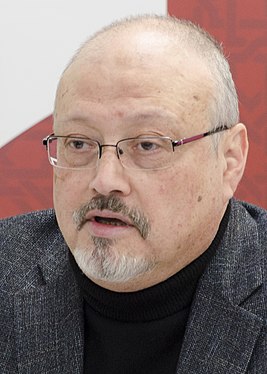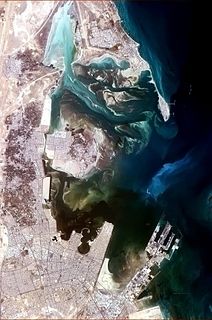
The economy of Saudi Arabia is one of the top twenty economies in the world (G20). It is dependent on oil as the country has the second-largest proven petroleum reserves, and the country is the largest exporter of petroleum in the world.
It also has the fifth-largest proven natural gas reserves and is considered an "Energy Superpower".
With a total worth of US$34.4 trillion, Saudi Arabia has the second most valuable natural resources in the world.

Wahhabism is an Islamic doctrine and religious movement founded by Muhammad ibn Abd al-Wahhab. It has been variously described as "ultraconservative", "austere",
"fundamentalist",
or "puritan(ical)"; as an Islamic "reform movement" to restore "pure monotheistic worship" (tawhid) by devotees; and as a "deviant sectarian movement", "vile sect" and a distortion of Islam by its opponents.
The term Wahhabi(ism) is often used polemically and adherents commonly reject its use, preferring to be called Salafi or muwahhid. claiming to emphasize the principle of tawhid, for exclusivity on monotheism, dismissing other Muslims as practising shirk, (idolatry). It follows the theology of Ibn Taymiyyah and the Hanbali school of jurisprudence, although Hanbali leaders renounced Abd al-Wahhab's views.

The flag of the Kingdom of Saudi Arabia is the flag used by the government of Saudi Arabia since March 15, 1973. It is a green flag featuring in white an Arabic inscription and a sword. The inscription is the Islamic creed, or shahada: "There is no god but Allah; Muhammad is the Messenger of God".

The House of Saud is the ruling royal family of Saudi Arabia. It is composed of the descendants of Muhammad bin Saud, founder of the Emirate of Diriyah, known as the First Saudi state (1744–1818), and his brothers, though the ruling faction of the family is primarily led by the descendants of Ibn Saud, the modern founder of Saudi Arabia. The most influential position of the royal family is the King of Saudi Arabia. King Salman, who reigns currently, chose first his nephew and then his son as the crown prince without consulting the Allegiance Council. The family is estimated to comprise 15,000 members, but the majority of the power and wealth is possessed by a group of about 2,000 of them.
The music of Saudi Arabia includes both Western and traditional music. The most distinguished musician in recent Saudi history is Tariq Abdulhakeem, who composed hundreds of famous Saudi songs for himself as well as for other singers. Saraj Omar has become a very prominent composer after writing the music for the Saudi national anthem. In 1999, the 1st Arab Pioneers Festival, which was held in Cairo under the patronage of the Arab League, honored four of the lead composers in Saudi Arabia: Tariq Abdulhakeem, Ghazi Ali, Mohamed Abdu, Saudi Arabia's first pop star, and Talal Maddah, known as the "Sound of the Earth", who died in August 2000 while singing in the summer festival on the stage of Al-Muftaha Theatre in the southern region of Saudi Arabia. Of the same generation are the oud virtuoso Abadi al Johar, Rabeh Saqer and Abdul-Majeed Abdullah.

The cultural setting of Saudi Arabia is greatly influenced by the Arab and Islamic culture. The society is in general deeply religious, conservative, traditional, and family-oriented. Many attitudes and traditions are centuries-old, derived from the Arab civilization and Islamic heritage. However, its culture has also been affected by rapid change, as the country was transformed from an impoverished nomadic society into a rich commodity producer in just a few years in the 1970s. This change has also been affected by a number of factors including the communications revolution and external scholarships. The most recent ruler or king of Saudi is King Salman of Saudi Arabia.

Human rights in Saudi Arabia are the subject of protection or violation by the government, which enforces Wahhabi religious laws under absolute rule of the Saudi royal family.
The Saudi Arabia national football team represents Saudi Arabia in international football. The team's colours are green and white. Saudi Arabia are known as Al-Suqour and Al-Akhdhar.

Salman bin Abdulaziz Al Saud has been King of Saudi Arabia, Prime Minister of Saudi Arabia, and Custodian of the Two Holy Mosques since 23 January 2015.

Jamal Ahmad Khashoggi was a Saudi Arabian dissident, author, government propagandist, columnist for The Washington Post, and a general manager and editor-in-chief of Al-Arab News Channel who was assassinated at the Saudi Arabian consulate in Istanbul on 2 October 2018 by agents of the Saudi government. He also served as editor for the Saudi Arabian newspaper Al Watan, turning it into a platform for Saudi Arabian progressives.

Articles related to Saudi Arabia include:
Capital punishment is a legal penalty in Saudi Arabia. The country performed at least 158 executions in 2015, at least 154 executions in 2016, and at least 146 executions in 2017.

Saudi Arabian cuisine encompasses the cuisines and foods of Saudi Arabia. In spite of the existence of many common dishes, Saudi dishes vary from a region to another as the culture itself varies.

The following outline is provided as an overview of and topical guide to Saudi Arabia:

The proven oil reserves in Saudi Arabia are the 2nd largest in the world, estimated to be 268 billion barrels, including 2.5 Gbbl in the Saudi–Kuwaiti neutral zone. They are predominantly found in the Eastern Province. These reserves were the largest in the world until Venezuela announced they had increased their proven reserves to 297 Gbbl in January 2011. The Saudi reserves are about one-fifth of the world's total conventional oil reserves, a large fraction of these reserves comes from a small number of very large oil fields, and past production amounts to 40% of the stated reserves.

Abdullah bin Abdulaziz Al Saud was King of Saudi Arabia and Custodian of the Two Holy Mosques from 2005 to his death in 2015.
He ascended to the throne on 1 August 2005 upon the death of his half-brother, King Fahd.
Sport in Saudi Arabia is an important part of Saudi Arabian culture and the country participates in many international sporting competitions. Football is a particularly popular sport and Saudi Arabia has won the Asian Cup on three occasions, while other sports such as cricket and basketball are also widely followed. Restrictions on women's sport in Saudi Arabia have been eased slightly in the 2010s but female participation in sport remains controversial.

The King of Saudi Arabia is Saudi Arabia's absolute monarch who serves as head of state and head of government. He is the head of the Saudi royal family, the House of Saud. The King is called the Custodian of the Two Holy Mosques, a title that signifies Saudi Arabia's jurisdiction over the mosques of Masjid al Haram in Mecca and Al-Masjid an-Nabawi in Medina, replacing His Majesty in 1986.

Mohammed bin Salman bin Abdulaziz Al Saud, colloquially known as MbS, is the Crown Prince of Saudi Arabia. He is currently serving as the country's deputy prime minister and is also chairman of the Council for Economic and Development Affairs, chairman of the Council of Political and Security Affairs, and minister of defense – the world's youngest at the time of his appointment. He has been described as the power behind the throne of his father, King Salman. He was appointed crown prince in June 2017 following King Salman's decision to remove Muhammad bin Nayef from all positions, making Mohammed bin Salman heir presumptive to the throne.













